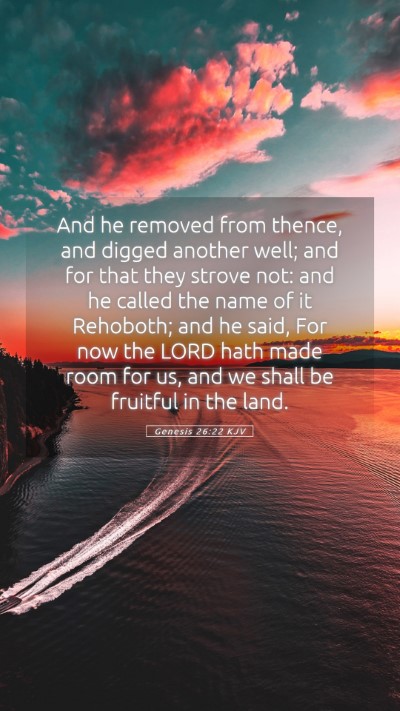Understanding Genesis 26:22
Bible Verse: Genesis 26:22 - "And he removed from thence, and digged another well; and for that they strove not: and he called the name of it Rehoboth; and he said, For now the LORD hath made room for us, and we shall be fruitful in the land."
Verse Explanation
This verse is a pivotal moment in the life of Isaac, illustrating his resilience and faith amidst opposition. It reveals profound insights about divine provision and the significance of perseverance. The well symbolizes both physical sustenance and spiritual abundance, reflecting Isaac’s trust in God's promises.
Historical Context
The historical backdrop of this passage is critical for a comprehensive understanding. Isaac, like his father Abraham, encountered challenges with the Philistines over water rights. Wells were vital for sustaining life in a desert climate, and disputes over water often led to conflict. By digging a new well, Isaac sought to remove himself from contention and establish God’s blessings in his life.
Commentary Insights
- Matthew Henry: He emphasizes the theme of perseverance despite obstacles. Isaac’s decision to move away from conflict and dig a well where there was no strife signifies God’s provision and our need to seek peace. Henry notes that God's promise of fruitfulness is realized through faith and perseverance.
- Albert Barnes: Barnes highlights the significance of the name "Rehoboth," meaning 'room' or 'space'. This name is indicative of God creating opportunities for His people. Barnes notes that God's blessings often follow our obedience and willingness to pursue peace rather than contention.
- Adam Clarke: Clarke elaborates on the spiritual implications of Isaac's actions, viewing the well as a metaphor for the believer's life in Christ. He discusses how the removal from strife leads to a place of spiritual fruitfulness, paralleling the Christian's journey from conflict to divine favor.
Biblical Themes
The verse encapsulates several key biblical themes:
- Divine Provision: The re-digging of the well symbolizes God’s provision in times of need.
- Perseverance: Isaac’s endurance despite opposition illustrates the importance of steadfastness in faith.
- Peace and Reconciliation: Choosing to move away from conflict reinforces the call for peace among believers.
- Fruitfulness: The promise of being fruitful in the land speaks to God's blessings on those who trust Him.
Application for Today
In applying Genesis 26:22 to contemporary life, believers are encouraged to seek peace in their relationships and circumstances. This verse teaches that sometimes it is better to step away from conflict to find the blessings that God has prepared. Reflecting on this, we can ask ourselves:
- Are there situations in my life where I need to seek peace instead of engaging in conflict?
- How can I trust in God's provision when faced with difficulties?
- What steps can I take to create “Rehoboth” in my life, a space where I can grow and be fruitful?
Bible Cross References
- Genesis 21:25: A similar conflict with wells between Abraham and Abimelech.
- Isaiah 54:2-3: God’s promise of blessing and expansion.
- Matthew 5:9: The call to be peacemakers.


